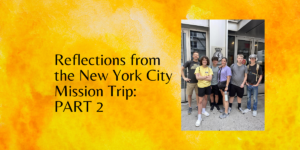Sunday, January 31, 2016 – Fourth Sunday after Epiphany
Proclaimer: Rev. Dennis W. Foust, PhD
Sermon: St. John’s Practicing One Anothering
Scripture: Romans 15:2-7; Ephesians 4:31-5:2; 1 Peter 4:8-10; 1 John 4:7-16
Exactly 2.5 miles from this room, in the Third Ward of Uptown Charlotte, is a seldom mentioned extremely important patch of grass. It is where the Charlotte Panthers practice.
St. John’s, your practice field is all over the Charlotte region. In the past week, on the practice field of one anothering, I am aware of these moments. One of you is walking alongside a person who is going through a very difficult season in life. A couple feeling their way through a transition that is physically and emotionally challenging welcomes the one anothering of another couple who provides transportation and encouragement. A parent seeks out another parent for some conversation about – you guessed it – parenting. One household takes supper to another and is just present to them in the love of Jesus. Two people meet for coffee just to catch up and one friend entrusts a prayer request to the other. Two families bless another family with items they know are needed. Two of you sit beside one another in a hospital. A person writes an email of encouragement to a woman she has not yet met; but she has walked a similar path.
Friends, many people are searching for this kind of one anothering. Yet, when they hear news headlines, this is not what they hear about church. If you were unchurched, de-churched or had been victimized or demonized by a church, why would you turn to the church for one anothering? We live in a crowded city where many people are overly busy barely staying afloat in a shallow world being depersonalized by a media that nurtures anxiety. Many people need a place to go where they can give up. But, we are going to have to invite them and embrace them.
Many people are searching for a community of others where they will be welcomed, loved, known and accepted; where they can invest their best in the vision of God’s kingdom. They are searching for a community of faith, where honest people love one another as they walk a covenant path and live an uncommon common life.
Some of you have read Thomas Cahill’s series of books entitled, The Hinges of History. In Volume 3, Desire of the Everlasting Hills: The World Before and After Jesus, he writes,
“We normally think of history as one catastrophe after another, war followed by war, outrage by outrage – almost as if history were nothing more than all the narratives of human pain, assembled in sequence…But history is also the narratives of grace, the recounting of those blessed and inexplicable moments when someone did something for someone else, saved a life, bestowed a gift, gave something beyond what was required by circumstance.”1
History is really the story of one life touching another life – or not. Look with me at today’s scriptures. Just as the Panthers must review the basics of football, so we must review the basics of practicing one anothering. Beware; practice isn’t always fun.
In Romans 15, we are reminded that we must ‘please one another.’ There is something inside of each of us that resents this message. Do you know anyone with these words on their refrigerator magnet? “Please your neighbor!” We live in a world that tells us, “please yourself” or “please those who can help you get what you want.” However, this is not how Jesus lived. So, you cannot follow Jesus by pleasing yourself or manipulating others for your own purposes.
The background of this passage is that some members of the Roman church were arguing over whether they should be eating a vegetarian diet, drinking wine and observing the Sabbath.2 Paul labeled the ‘weak’ to be those who abstained from meat and wine and saw some days as more sacred than others. The practice taught here is that the strong must bear the weaknesses of the weak to build up the strength of the body. In other words, we are in this together.
Next Sunday, in the Super Bowl, I fully expect the Carolina Panthers’ defense to make up for Thomas Davis’ broken arm. We must listen to one another’s perspectives as valid. Yet, we must remember our focus in one anothering is not merely on one another; our one anothering is to reflect the character of God as revealed in Jesus. The early church did not allow the vegetarians and prohibitionists to rule the day. Yet, they listened to one another and they made decisions together in ways that were focused on God and Jesus and one anothering. I like the words of Thomas Merton who said, “The beginning of love is to let those we love be perfectly themselves and not to twist them to fit our own image. Otherwise, we only love the reflection of ourselves we find in them.”
In our second scripture reading today, we find words written around 100 A.D. The second and third generation church was trying to figure out what made their life together, as followers of Jesus, different from everyone else. In 1 John 4, the word, ‘agape,’ is used 28 times. Agape is the Greek word for love that explains how God loves humanity. In other words, what makes Christ’s Church different is how we love one another. We love the way God loves!
Decades ago, the people of St. John’s started following an interpretation of Jesus’ life and ministry that defines God’s love to be welcoming, inclusive and gracious. Throughout our history, as a community of faith, we have taken down walls of separation, dispelled prejudice, worked against hatred, offered hospitality, opened the doors of fellowship and bestowed the same grace of God upon others that we ourselves have received. I like the way Frederick Buechner speaks of grace: ‘Grace is something you can never get but only be given.’
Someone recently wrote to me asking about our decision to define marriage as commitment and perform weddings of any two persons – so long as a shotgun is not involved. Here is part of what I wrote to them:
‘St. John’s follows Jesus as the one who is the incarnation of God’s love. In Jesus, we find a God who never pushes people away. In Jesus, we find a God who touches & serves people – especially those who have been told they have to be different to be loved by God. Jesus touched people to remind them they were different because they were already loved by God. In Jesus, we find a God who goes out of his way to relate with persons living in the shadows of guilt or shame. In Jesus, we find a God who offers people the healing love that transcends religions. In Jesus, we find a God who only condemns those who voice condemnation of others. In Jesus, we find a God who is always striving to reach the hearts of the estranged, suffering, lost, demonized, rich and poor, insider and outsider so they can experience the embrace of a reconciling and redeeming life-giving relationship with God.
St. John’s understands that everyone does not experience God in this way. We are merely trying to listen to God and to one another as we love the way we have experienced God’s love for us. If we incarnate God’s love in a way that builds walls of separation, then we are offering to the world a God we do not know; a God beyond our experience. In the words of scripture, “God is love, and those who abide in love abide in God, and God abides in them.”’
Friends of God, many people need a place where they can go to give up. Let’s go find them and bring them here so they can practice one anothering with us. Amen and AMEN!
1 Thomas Cahill, Desire of the Everlasting Hills: The World Before and After Jesus, Anchor Books, 2001, preface.
2 See Romans 14.









